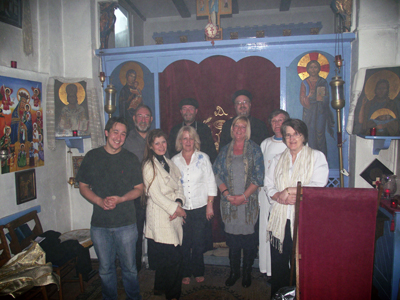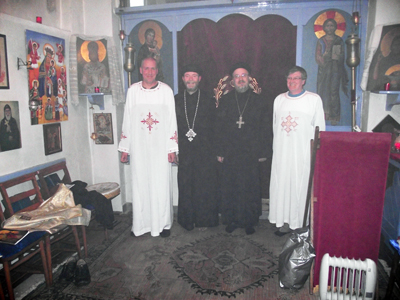First Orthodox Education Day planned for 9 October
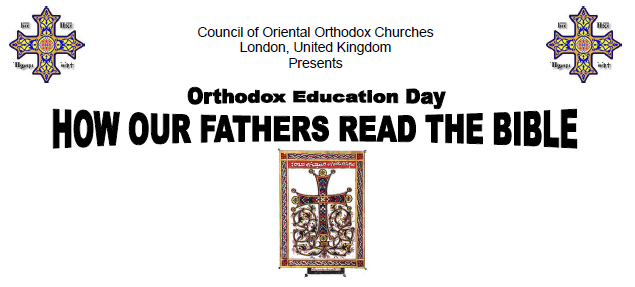 Join us for a day of exploring the Bible and reflecting upon it as the source of our faith and inspiration. The faithful of the Armenian, Coptic, Eritrean, Ethiopian, Malankara Indian and Syrian Orthodox Churches and the affiliated churches are cordially invited to attend this daylong educational seminar and great opportunity for fellowship.
Join us for a day of exploring the Bible and reflecting upon it as the source of our faith and inspiration. The faithful of the Armenian, Coptic, Eritrean, Ethiopian, Malankara Indian and Syrian Orthodox Churches and the affiliated churches are cordially invited to attend this daylong educational seminar and great opportunity for fellowship.
Location: Nevart Gulbenkian Hall
St. Sarkis Armenian Orthodox Church
Kensington, London
Date: Saturday, 9 October, 2010
Time: 10:00am-3:00pm
According to the following schedule:
- 10:00 AM: Matins in the Armenian Church
- 10:15 AM: Registration, Tea and coffee in the Church Hall
- 10:30 AM: Welcome and announcements
- 10:40 AM: Message by His Grace Bp. Angaelos, Coptic Orthodox Church
- 10:45 AM: Lecture 1– His Grace Abba Seraphim: “The Septuagint in the Oriental Orthodox Traditions”
- 11:15 AM: Lecture 2 – V. Revd Fr. Vahan Hovhanessian: “The Bible as the source of spirituality in the writings of the Armenian Church Fathers.”
- 11:45 PM: Q&A Re: lectures 1 & 2
- 12:00 Noon: Lunch (buffet)
- 1:30 PM: Lecture 3 – Revd Fr. Peter Farrington: “The Bible as the source of Orthodox Christology.”
- 2:00 PM: Q&A Re: lecture 3
- 2:10 PM: General Discussion
- 2:25 PM: Announcements
- 2:30 PM: Final blessing
Registration for attendees will be £5.00 to defray the cost of the lunch and materials
For further information or to sign up in advance please e-mail: [email protected]
Unlabelled halal meat in British supermarkets
Asked to comment on recent press reports that unlabelled halal meat is on sale in British supermarkets, Abba Seraphim observed:
“When the Holy Apostles met together at the Council of Jerusalem in AD 50 to deliberate on whether the Mosaic law’s requirement of circumcision and other dietary regulations should be required of the Christian Church, they concluded with the ruling, “For it seemed good to the Holy Ghost, and to us, to lay upon you no greater burden than these necessary things; that ye abstain from meats offered to idols, and from blood, and from things strangled, and from fornication: from which if you keep yourselves, ye shall do well” (Acts XV: 28-29).
Orthodox Christians still observe feasts and fasts of the church and abstain from certain forms of food and drink both out of reverence and as a spiritual discipline. Now that we live in a multi-cultural society some of the issues addressed by the Council of Jerusalem have become more relevant to us than they would have been a generation ago. Other faiths still regard what they eat and drink as important and in many cases their rites have a deep religious significance. Hindus and Sikhs, when celebrating their feast of Diwali, as part of their devotions offer delicacies and sweets to their gods. These are afterwards shared with friends and neighbours as a fraternal gesture but should be politely declined by Christians, without causing offence, because they come within the apostolic prohibition.
Both Jews and Muslims respect the prohibition against eating foods offered to idols and have strict rules of kosher and halal to regulate this. Some strict Judaic schools teach that as the Talmud views all non-Jews as idolaters any food which has been cooked or prepared completely by non-Jews is prohibited, although rabbis or other religious officials do not “bless” food to make it kosher. However, in Islam dhabiha or the ritual of slaughtering, requires that Allah’s name should be pronounced before each slaughter. For Christians to eat food blessed in any name other than the ‘Father, Son and Holy Spirit, One God’, would be unacceptable and it might even be construed that by passive acceptance the recipient has in some measure consented to the kalima, or Islamic declaration of faith.
Recent press reports that leading British supermarkets have been selling halal meat without any labelling to indicate this, give cause for concern. That other faith communities should wish to prepare their food in a manner appropriate to their own religious and dietary requirements is something we must respect, but equally the failure to make this clear to the public by clear labelling demonstrates a lack of respect for Christian sensibilities and is to be deplored. The British Orthodox Church has already been in touch with some of the leading supermarkets to express our concern and I would encourage individual Christians to make appropriate representations themselves.”
Giulio Paletta’s photographs of Tur Abdin
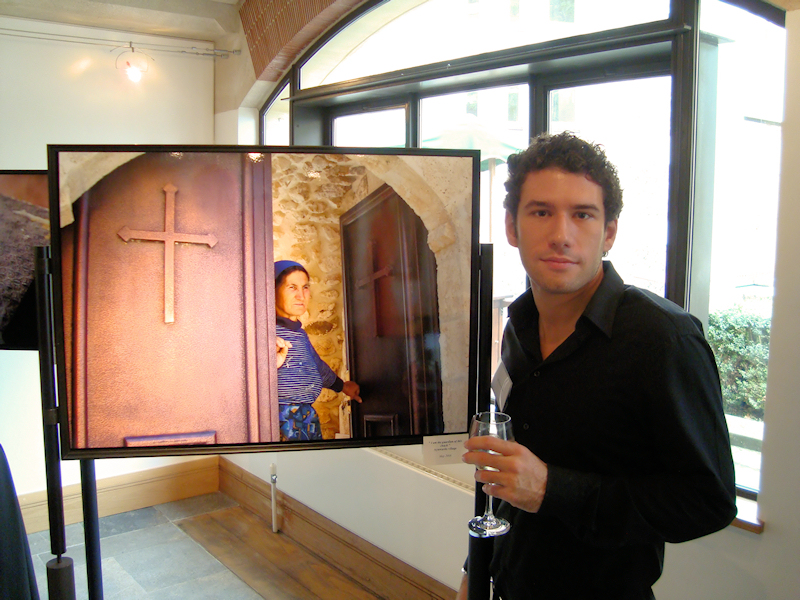
On Monday, 27 September, His Grace the Archbishop of Canterbury (Dr. Rowan Williams) opened an exhibition of photographs of Tur Abdin by the Italian photo-journalist, Giulio Paletta.
Tur Abdin in south-east Turkey has been the home of Syriac Christians since the ealy days of the church and these villages were once the flourishing centre of a great Christian culture, which suffered during the unsettled years which marked the fall of the Ottoman Empie and the persecution faced by ethnic minorities. In more recent times the Syriac Christians were caught up in the violence of Kurdish separatism and a population of some 20,00 had fallen to a mere 2,000 by 1995. Today the ancient monastery of Mor Gabriel stands as the centre of Syriac culture in this area but is under threat from predators who lay claim to ancient monastic lands.
This exhibition was organised by the Tur Abdin Focus Group to raise awareness of the Christians of Tur Abdin and to show concern and support for the problems they are facing. In welcoming the Archbishop, the Bishop of Woolwich (The Right Rev’d Christopher Chessun), who is the chairman of the Group, read out letters of greeting and appreciation from Archbishop Samuel Aktas of Tur Abdin as well as H.H. Mor Ignatius Zakka I, the Patriarch of Antioch. Dr. Williams spoke movingly of the invaluable spiritual tradition embodied in the Tur Abdin community and of its spiritual and cultural value to the wider community.
The opening was well supported and attended both by His Excellency the Syrian Ambassador and representatives of the Turkish Embassy and covered by both Turkish and Syriac media including Suroyo TV, Suroyo SAT and Hurriyet. Metropolitan Mor Polycarpos Aydin, Patriarchal Vicar in the Netherlands, represented the Patriarch of Antioch. Abba Seraphim, attended as a member of the Tur Abdin Focus Group, and represents the Council of Oriental Orthodox Chuerches in the United Kingdom.
The photographs are not merely of churches and liturgical ceremonies but contain some very striking images of the simple rural life of the Suriani and personal portraiture which highlight the vitality and uniqueness of this community. The exhibition can be viewed at Southwark Cathedral until 18 October after which it will be moved to Chichester Cathedral and travel to other centres.
(http://www.focusmorgabriel.com/)
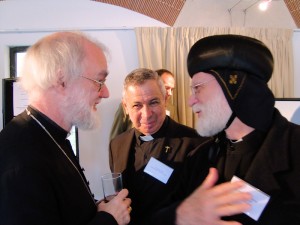
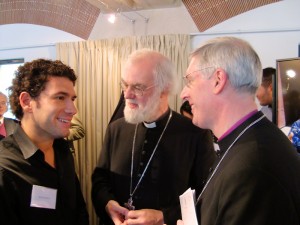
Bournemouth Weekend of Worship & Orthodox Spirituality
The Bournemouth Church hosted a themed weekend from 24-26 September, which was supported by members of the local congregation as well as members from Portsmouth and Chatham and a catechumen from Hertfordshire. The programme was led by Father Simon Smyth and supported by Father Peter Farrington on the Saturday.
Following vespers on Friday night, the Russian film OCTOB (pronounced Ostrov) or Island, which starts with a monk in a desolated place praying the Jesus Prayer, followed by a flash back to 1942 and the war, as the story gradually unfolds. It is a story about the human soul which tells of forgiveness, repentance, human hearts and sin, and the confrontation of each of these with the Holy.
Next day, after morning prayer, the second session began with a follow-up to several points raised by the film, including Holy Fools, such as Saint Basil of Moscow, and to show that this was not something restricted to Russian Orthodoxy, mention was also made of Saint Francis of Assisi. It also focussed on how those who are not called to the monastic life can learn and profit from the example of monks and nuns and live lives of prayer and worship in the world, whilst also earning a living and supporting families. Brief clips were viewed from a film biography of the Scottish footballer Jimmy Johnstone (1944-2006) with colleagues and former players explaining their youthful obsession with the sport and the time and effort they put in being rewarded by the high level of skills they developed. The parable intended had been that although working people with family commitments might not be expected to put in the hours of prayer one might more reasonably expect from monks, nonetheless the more time and effort that could be put into our spiritual lives the better the spiritual fruit. It was also noted that these boys had not sat around lamenting that they could be good footballers if only they had a coach to teach them or even a proper football, just as we shouldn’t lament that if only we were monks or nuns or had more time we could become more spiritual. The footballing contribution was nicely balanced with a brief consideration of George Herbert’s seventeenth century poem The Elixir:
Teach me, my God and King,
In all things Thee to see,
And what I do in anything,
To do it as for Thee.
The other two morning sessions were on Prayer and then, specifically, the Jesus Prayer. Following the Sixth Hour prayer at noon there was a long lunch break allowing time for fellowship and reflection when most of those present went for walks together.
Afternoon Prayer was prayed together at 3 o’clock, followed by a discussion on Repentance, including a brief Power-Point presentation illustrating repentance, progress and sanctity using JCB excavators, shovels and a microscope. Some of us are like excavators and barely notice the dirt and muck not cleaned away; some have progressed sufficiently to notice the weight of dirt not cleaned off a shovel but others, like the saints on the icons who, like the high powered microscope, were aware of one speck of dirt. Abba Sisoes was just such a one. At his death when his disciples were exclaiming that he had no sins left to repent from, he answered that he didn’t know if he had even begun to repent. A lively discussion followed with contributions from everyone which led naturally into considerations of purification and illumination. The final session was on Silence and Stillness and included a handout on Christians striving to live a life of inner silence and prayer in New York. So the discussions came full circle to living an Orthodox spiritual life where we are, here and now.
Saturday concluded with Vespers. During the three different hours of prayer prayed that day the psalms were recited in several ways: either antiphonally around the congregation, each person praying the psalm allocated to them or each person praying simultaneously the psalms allotted to them. This was intended to enable everyone to experience different ways of praying the services so they might choose what worked best for them in their own prayer meetings.
Sunday began with the Divine Liturgy and after lunch the final half hour of the film was viewed (which had been held back from Friday so as not to spoil the surprise in the story) with its moving ending and the weekend concluded with Afternoon Prayer. The weekend was greatly appreciated by all those present for the opportunities for prayer and reflection and for the hard work by Fr. Simon in planning and organising the talks and discussions.
Father Michael celebrates 77th birthday
Father Michael Robson celebrated his 77th birthday at Callum Welch Court, the nursing home attached to Morden College at Blackheath. Although physically frail he remains in good spirits and enjoys opportunities to meet old friends. He is much loved and respected at Morden College and although he was not well enough to attend the Liturgy when Abba Seraphim last celebrated it in the college chapel on 24 August, many other members of the college attended and prayed for him. For his birthday, Father Michael had several visitors and was busily occupied opening the many cards and greetings received. Abba Seraphim, returning from the Liturgy at Babingley, brought him Holy Communion and prayed with him and gave him the latest news of the church.
The next Morden College Liturgy will be on 12 October (see the Calendar for details).

